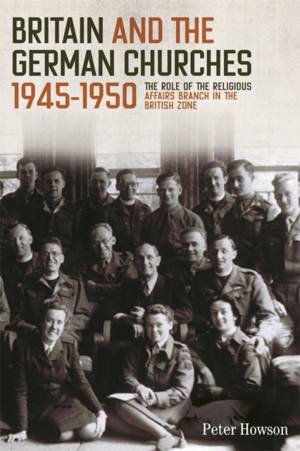
- Afhalen na 1 uur in een winkel met voorraad
- Gratis thuislevering in België vanaf € 30
- Ruim aanbod met 7 miljoen producten
- Afhalen na 1 uur in een winkel met voorraad
- Gratis thuislevering in België vanaf € 30
- Ruim aanbod met 7 miljoen producten
Zoeken
Britain and the German Churches, 1945-1950
The Role of the Religious Affairs Branch in the British Zone
Peter Howson
€ 209,45
+ 418 punten
Omschrijving
It is well known that at the key allied conferences during the latter part of World War II the future victorious allies were already progressing their post-war planning. Duly, an Allied Control Commission, with the task of providing administrative functions and eventually handing them over to an elected government, was formed in post-war Germany. In the Western zones, the cornerstone of coordinated administration was a policy of denazification, demilitarisation and democratization. Almost all sectors of German life would thereafter to be administered by the Allies.
German Churches and religious affairs had, however, been promised to the defeated Germany. Of course, Nazism hadn't spared the Christian churches, and so questions of denazification and the future relationship between church and state in Germany remained significant. This book examines the British approach towards post-war German religious and ecclesiastical life by highlighting the role of the British Element of the Control Commission, more specifically the Religious Affairs Branch that was separated from the Education Branch at the end of 1945. Considering British attitudes to Catholics and Protestants, as well as the remaining Jewish and Muslim communities in Germany, this book uncovers allied differences with regards to organising future religious life in Germany.
German Churches and religious affairs had, however, been promised to the defeated Germany. Of course, Nazism hadn't spared the Christian churches, and so questions of denazification and the future relationship between church and state in Germany remained significant. This book examines the British approach towards post-war German religious and ecclesiastical life by highlighting the role of the British Element of the Control Commission, more specifically the Religious Affairs Branch that was separated from the Education Branch at the end of 1945. Considering British attitudes to Catholics and Protestants, as well as the remaining Jewish and Muslim communities in Germany, this book uncovers allied differences with regards to organising future religious life in Germany.
Specificaties
Betrokkenen
- Auteur(s):
- Uitgeverij:
Inhoud
- Aantal bladzijden:
- 305
- Taal:
- Engels
- Reeks:
- Reeksnummer:
- nr. 43
Eigenschappen
- Productcode (EAN):
- 9781783275830
- Verschijningsdatum:
- 18/06/2021
- Uitvoering:
- Hardcover
- Formaat:
- Genaaid
- Afmetingen:
- 152 mm x 231 mm
- Gewicht:
- 635 g

Alleen bij Standaard Boekhandel
+ 418 punten op je klantenkaart van Standaard Boekhandel
Beoordelingen
We publiceren alleen reviews die voldoen aan de voorwaarden voor reviews. Bekijk onze voorwaarden voor reviews.








